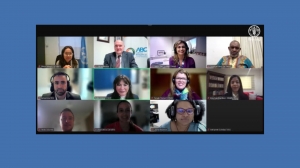FAO and the Brazilian government celebrate 15 years of the School Feeding Law, a global reference
The event brought together representatives from Brazil and other countries in the region, who highlighted the innovations of this law. The initiative currently serves 40 million students daily in Brazil.

“The guarantee of nutritious and healthy food for children and adolescents is essential for the food security of families and the reduction of inequalities," said the First Lady of Brazil, Janja Lula da Silva, ambassador for school feeding in the country, during the inauguration of the international event celebrating 15 years of the Brazilian School Feeding Law. She also stressed that Brazil and FAO have been taking the example of Brazilian school feeding to the world for over 15 years.
The event was organized by the National Fund for the Development of Education (FNDE), with the support of the Brazilian Cooperation Agency of the Ministry of Foreign Affairs (ABC/MRE) and the Food and Agriculture Organization of the United Nations (FAO), under the Brazil-FAO International Cooperation Program. The activity also included the participation of the Center of Excellence against Hunger of the World Food Program (WFP) in Brazil and government representatives of school feeding programs in the Dominican Republic and São Tomé and Príncipe. The event was broadcast on social networks and gathered around 850 people in real-time.
The president of FNDE, Fernanda Pacobahyba, highlighted that the law institutionalized the National School Feeding Program (PNAE) as a State policy that has endured, advanced, and improved, currently serving about 40 million students daily. Pacobahyba added that she is proud of the Brazilian program's contribution to constructing school feeding policies in other countries through international cooperation, emphasizing the partnership with ABC, FAO, and WFP in the mission to share Brazilian experiences, practices, and knowledge with other nations. "This law has inspired numerous countries, and this is due to its many advances."
The general coordinator of PNAE, Karine Santos, mentioned that the law brought the obligation that at least 30% of the food for students be acquired from family agriculture. She also highlighted the principles of universality, the strengthening of social participation through the School Feeding Councils (CAE), the promotion of food and nutrition education actions, and that, for all this, it has become a mechanism for guaranteeing the human right to adequate food. "These advances were only possible because we worked in a coordinated and articulated manner at the federal level and with the subnational entities, the states and municipalities that implement this program."
A law that crossed Brazil's borders
Since 2009, the Brazil-FAO International Cooperation Program, ABC, FNDE, and FAO have developed projects to strengthen and consolidate school feeding programs and policies in Latin America and the Caribbean.
Maya Takagi, FAO senior policy officer, pointed out that the Brazilian law crossed borders and inspired six countries in the region to formulate and enact specific school feeding laws: Bolivia, Ecuador, Guatemala, Honduras, Panama, and Paraguay. Three others are developing their regulatory frameworks: Chile, El Salvador, and the Dominican Republic.
Plinio Pereira, deputy head of trilateral South-South technical cooperation with international organizations of the ABC, stressed that school feeding is strategic and important to combat hunger because of its multidimensional and intersectoral approach, also thanking the FNDE for the partnership with the ABC, FAO, and WFP.
Ana Carolina Baez, director of nutritional formulation and evaluation of the National Institute of Student Welfare of the Dominican Republic (INABIE), emphasized that the Brazilian legislation fully translates the principles of sustainable school feeding. "There were many lessons learned from exchanges of experiences, technical support, and courses, but above all, we need to know that there is much we can still do in our countries," Baez informed that a bill is already before the Dominican National Congress for approval.
Emanuel Montoya, the coordinator of the school feeding and health program in São Tomé and Príncipe, highlighted the role of the Brazilian government and international organizations in creating his country's school feeding law in 2012. "Much of this program has to do with the support we received from Brazilian cooperation and the Brazilian experience."
Najla Veloso, coordinator of the Regional Agenda for Sustainable School Feeding project in LAC, said that international technical cooperation also contributed to the strengthening of the law in Brazil and allowed it to cross borders. She concluded: "We applaud FNDE and the global benchmark that is Brazil's School Feeding Law, enacted in June 2009, which for the past 15 years has been transforming the quality of school feeding in the country and the world.
